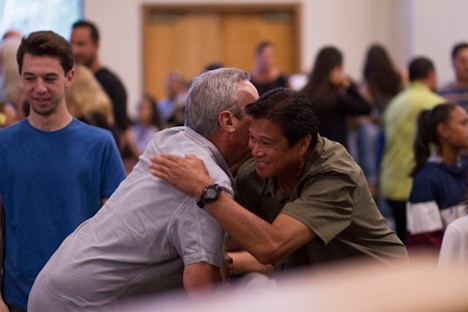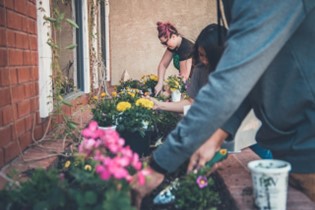Mark Leuthauser is a practitioner at Third Way Conflict Resolution. With a background spanning nearly a decade in his local Department of Social Services and specialized training in conflict resolution, Mark has proven himself a trusted mediator and arbitrator, equipped with certifications from the New York State Unified Court System. In the following article, Mark Leuthauser of Whitesboro explores the transformative impact of a grassroots approach to conflict resolution at the community level, highlighting the role of dialogue, collaboration, and empowerment in creating harmonious and resilient neighborhoods.
In every neighborhood, conflicts are inevitable. From disagreements between neighbors to disputes over shared resources, unresolved conflicts can strain relationships and diminish the sense of community cohesion. However, Mark Leuthauser of New York says that there is a growing recognition of the importance of community-based conflict resolution initiatives in fostering dialogue, building trust, and strengthening neighborhood bonds.
Mark Leuthauser Discusses the Need for Community-Based Conflict Resolution
Conflicts are a natural part of community life, but when left unresolved, they can escalate and negatively impact the well-being of residents. Mark Leuthauser says that from noise complaints and property disputes to interpersonal conflicts and cultural misunderstandings, unresolved conflicts can erode trust and cohesion within neighborhoods. Community-based conflict resolution programs offer an alternative to traditional legal processes, providing residents with accessible and effective avenues for resolving disputes and restoring peace.
Initiatives in Community Conflict Resolution
 Community Mediation Centers
Community Mediation Centers
Mark Leuthauser of New York highlights that these centers serve as neutral spaces where trained mediators facilitate constructive dialogue and negotiation between parties in conflict. By empowering individuals to voice their concerns and collaborate on finding mutually acceptable solutions, mediation centers help prevent conflicts from escalating into costly legal battles.
Case studies and success stories from community mediation centers across the country showcase how conflicts ranging from noisy neighbor disputes to landlord-tenant disagreements have been successfully resolved through dialogue and mediation.
Neighborhood Reconciliation Programs
These programs focus on repairing and rebuilding relationships between individuals or groups involved in conflicts within the same community. By promoting empathy, understanding, and forgiveness, reconciliation programs aim to heal past wounds and foster a sense of unity and belonging among residents.
Mark Leuthauser of New York explains that through structured dialogue sessions, restorative circles, and facilitated discussions, participants in neighborhood reconciliation programs have the opportunity to share their perspectives, acknowledge harm, and work towards reconciliation and healing.
Conflict Resolution Training for Community Leaders
Mark Leuthauser of Whitesboro says that empowering community leaders, including neighborhood association members, clergy, and local volunteers, with conflict resolution skills and techniques can help prevent conflicts from escalating and promote early intervention and resolution.
Training programs cover topics such as active listening, effective communication, negotiation strategies, and de-escalation techniques, equipping community leaders with the tools they need to address conflicts proactively and constructively.
The Impact of Community-Based Conflict Resolution
 Strengthening Social Cohesion
Strengthening Social Cohesion
By fostering dialogue, empathy, and understanding, community-based conflict resolution initiatives contribute to the development of strong social ties and networks within neighborhoods.
Mark Leuthauser of Whitesboro reports that residents feel more connected to their community and are more likely to collaborate on shared goals and projects when they know that conflicts can be resolved peacefully and constructively.
Building Trust and Resilience
When residents see that their concerns are being heard and addressed through community-based conflict resolution processes, trust in local institutions and authorities increases.
Many communities become more resilient in the face of challenges and crises when residents have established channels for communication, problem-solving, and conflict resolution.
Empowering Residents
Community-based conflict resolution initiatives empower residents to become proactive contributors to the well-being and cohesion of their neighborhoods. By equipping community members with the necessary skills and resources to address conflicts effectively, these initiatives foster a sense of ownership and responsibility among residents.
As individuals become more adept at resolving disputes locally, communities become less reliant on external intervention and develop greater self-sufficiency. This not only enhances the overall resilience of the community but also promotes a culture of collaboration and mutual support among residents. Ultimately, community-based conflict resolution strengthens the social fabric and empowers individuals to actively shape the future of their communities.
Conclusion
Community-based conflict resolution is not just about resolving disputes; it’s about building stronger, more resilient neighborhoods where residents feel connected, supported, and empowered. Mark Leuthauser of Whitesboro says that by investing in dialogue, collaboration, and trust-building initiatives, communities can create environments where conflicts are seen as opportunities for growth and reconciliation rather than sources of division and discord.
As we aspire to build inclusive and harmonious communities, let us acknowledge the transformative power of grassroots conflict resolution approaches in reinforcing the social fabric and promoting unity among residents.









